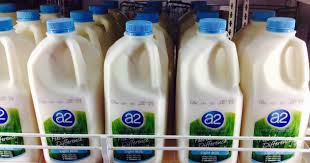Child Two has always had a problem with milk. As soon as she started on formula at a year old, she began to develop mysteriously persistent coughs and colds, which for a long while I put down to Belgium’s climate (even damper than the UK). It got so bad that I had to take her to a physiotherapist to clear the gunk out of her lungs. This woman, while not exactly brutal, treated my baby treasure in a way that I found extremely alarming. She would hold her upside down on her lap and massage vigorously until poor Child Two finally coughed up some gunk. We called her the Squeezing Lady. In the end the GP suggested we get her tested for milk intolerance, not something that doctors talked of in Britain at the time. Sure enough, when the results came back, they showed she was hugely intolerant to milk and she spent many years on soya formula, then ordinary soya milk. The only time she would suddenly be afflicted with sniffles and eczema would be in the summer. For years I puzzled. Then, one hot day as I watched her on the beach, it clicked. She was licking her way happily through an ice cream cone. Yes, ice cream was the culprit. Even now, she much prefers the taste of soya and still suffers occasionally from outbreaks of eczema if she’s been having too much dairy.
In a way, this shouldn’t have been a surprise. I’ve always rather loathed milk and milky drinks – my idea of hell was having to drink those little bottles of milk at school, that got left on the window sill all morning and were lukewarm and, to me, cheesily thick and cloying by break time. Bleurgh. I don’t even like cream or ice cream (though I do really like yoghurt). When I had gastritis a year ago I realised that drinking a lot of tea (to which I am hopelessly addicted) could be a problem. For every gallon of Earl Grey I was probably knocking back a pint of milk, and my body just doesn’t like it.
But now, for everyone like me, left feeling bloated and horrible after drinking too much milk, a clever new product has been developed. Called a2 Milk, it’s for people who may react to the A1 protein in milk – apparently this is the little blighter that causes all the trouble – but who are not officially lactose intolerant. Child Two is probably in this group, having grown out of her allergy and being left with an aversion.
The a2 Milk Company uses British dairy cows carefully selected because they naturally produce milk containing only the A2 protein and no A1 protein. They work with 20 herds of naturally a2 milk-producing cows in the Shropshire and North Wales area, producing fresh a2 milk every day. a2 Milk is not suitable for anyone medically diagnosed with galactosaemia, lactose intolerance, a milk allergy or other milk protein intolerances. But it could make all the difference if milk just leaves you feeling a bit yucky. Worth a try.

Sponsored by a2
